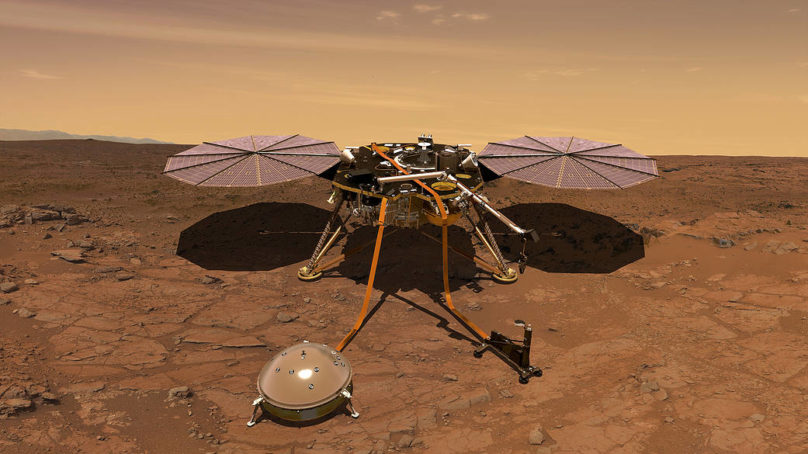
On Monday, Nov. 26, after a six-month cruise, NASA’s InSight Lander will touch down on Mars. Insight is the first Mars mission designed to study the deep interior of Mars. It will measure the flow of heat from the inside of Mars, listen for Marsquakes, and track the rate at which the polar axis of Mars wobbles as the red planet orbits the Sun.
InSight is the latest in a series of missions, including the Curiosity Rover (Mars Science Laboratory) and MAVEN (Mars Atmosphere and Volatile Evolution) Orbiter, that are actively studying Mars. Next up, in 2020, the European Space Agency will send the ExoMars Rover, and NASA will send the Mars 2020 Rover. Both of missions will focus on astrobiology, looking for signs of life on Mars.
Why the enormous effort to study Mars? Mars is the closest place in the universe where extraterrestrial life might exist. We have learned that several billion years ago, Mars had water covering much of its surface. On a warm and wet Mars, life could have flourished. We have also learned that, over the eons, Mars has lost much of its atmosphere to space. Today, with a thin atmosphere that does not protect the surface from dangerous radiation from space, and with a temperature that no longer permits large bodies of liquid water to exist on the surface, life on Mars, if it exists at all, has burrowed underground.
Our rovers are a first step in robotically exploring Mars to search for signs of ancient life, as well as evidence for living, breathing Martians. Admittedly, any Martians currently inhabiting caves or other underground locations on Mars are likely no more advanced than bacteria. But they would be Martian bacteria. Mars would be their planet.
The possibility that Mars could be inhabited raises important ethical questions regarding the current space race to Mars. If Mars is sterile, a human presence there would create no moral or ethical dilemmas. But if life does exist on the red planet, human explorers will contaminate Mars and could easily lead to the extinction of Martian life. Do we have the inalienable right to put Martian life at risk?
Since the start of the space age, scientists have taken the threat of biological contamination of other worlds seriously. As early as 1959, NASA held meetings to debate the necessity of sterilizing whatever might be sent to other worlds. Since then, all planetary exploration missions have adhered to sterilization standards that balance their scientific goals with limitations of not damaging sensitive equipment, which could potentially lead to mission failures.
Today, NASA protocols exist for avoiding the biological contamination of all solar system bodies, including Mars. But those protocols are designed to minimize the possibility of sending bacteria to other worlds on robots like Curiosity and InSight. Humans, along with their food, habitats, life support systems, and tools, cannot be sterilized. Simply stated, human colonists will contaminate Mars and thereby put Martian life at risk.
Future generations of rovers will be able to explore caves, drill ice cores and do other experiments that might reveal the extent of Martian life or offer very strong proof that no Martians exist. Since we have the technology to use robots to determine whether Mars is inhabited, I believe we should put the brakes on all plans to send humans to Mars and let InSight and other robotic landers explore Mars for us. Once we have a definitive answer to the question “Does life exist on Mars,” we can debate whether we humans have the right to set foot on Mars.
 About the Author
About the Author
David Weintraub is Professor, Director of Undergraduate Studies and Director, Program in Communication of Science & Technology at The Department of Physics and Astronomy at Vanderbilt University. His new book, Life on Mars: What to Know Before We Go takes a step back from the all-systems-go approach to colonizing another planet and considers the ethics of potentially destroying its bio-ecosystem. There’s no better time to think about the implications of such a trip, Weintraub contends, with both NASA and entrepreneur Elon Musk working to make it happen. Weintraub is also the author of Religions and Extraterrestrial Life: How Will We Deal With It? and two other books.



